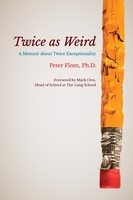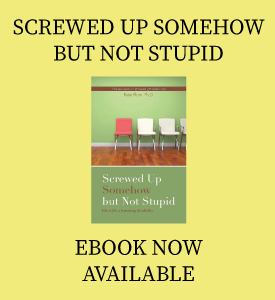I’m disabled. More specifically, I’m learning disabled. Even more specifically, I have nonverbal learning disabilities. Not differences, disabilities. There are things that virtually all NT people (NT = neurotypical, the acronym for people who think they don’t need one) . A ‘difference’ is something you might choose – more rational or more emotional? More mathematical or more artistic? – A disability is something you wouldn’t choose, and I’m disabled. I am, that is, UN able to do some things. Hence the word.
But I am also abled. Here’s a nice little red squiggle under ‘abled’ to remind me that Word thinks it isn’t a word. Isn’t that a commentary on the world? That is, we have no problem (and no red squiggle) with disabled but we have a hard time with abled. Why should that be?
Not only am I abled, in some ways, I am more able than the average NT. I am better at math than the average NT person; I am also good at reading. I spell very well. And my grammar doesn’t stink. (I’m also insanely modest, but don’t tell anyone).
When people hear the word “disabled” I think they tend to go to a picture of a cripple (I use this offensive term deliberately). They think of a beggar asking for change on the street, or a person living in a sheltered environment, unable to care for him or herself. Some of us are like that; and, of course, some of you NT people are like that too. Or else they leap to an image of Helen Keller (blind, deaf, summa cum laude graduate of Radcliffe) and, yes, some of us are like that, too. As are some of you NT people.
Most of us, though, are like you. Abled. Not supremely gifted. Not geniuses. Most of us don’t win Nobel prizes, go to the Olympics, or write best-selling novels. And, in fact, most of you don’t, either. Those are extraordinary accomplishments, and they are called extraordinary because they are outside (extra) the ordinary. Most of us are ordinary. We just have some more severe deficits than you do.
In graduate school, I had a hard time figuring out how to get from the bus stop to class. After getting my PhD, I still got lost on the way home from work. Even though I can do statistics, I can’t figure out how to fold a paper bag or make a bed or strike a match; I still can’t visualize anything, and I still mis-estimate the time it will take to do things. I’m disabled. But I’m also abled.
Most of us disabled people are like that. Doing our best, trying to cope



Though much is taken, much abides is one of my favorite quotes (Tennyson)
It fits you perfectly, Peter.